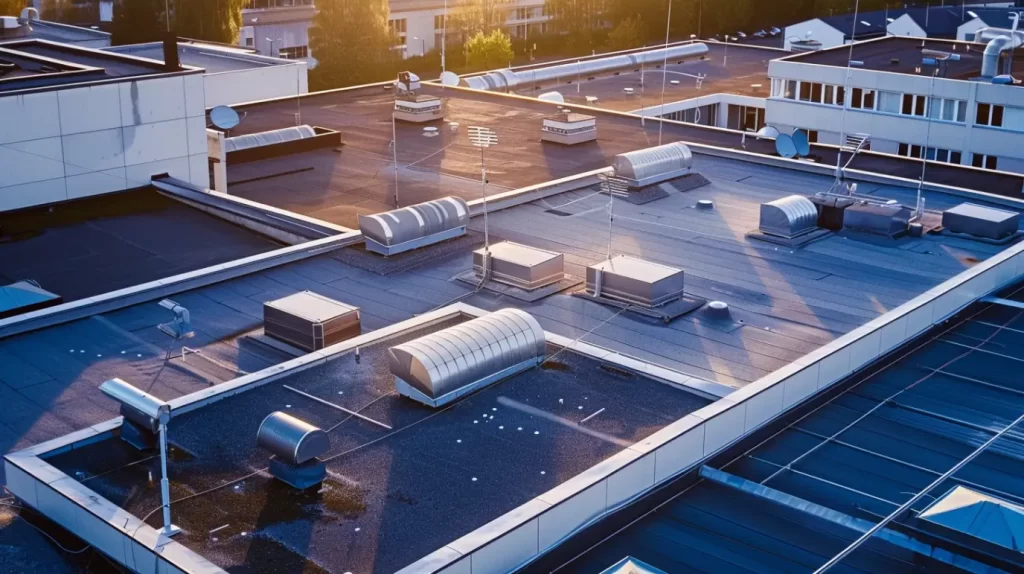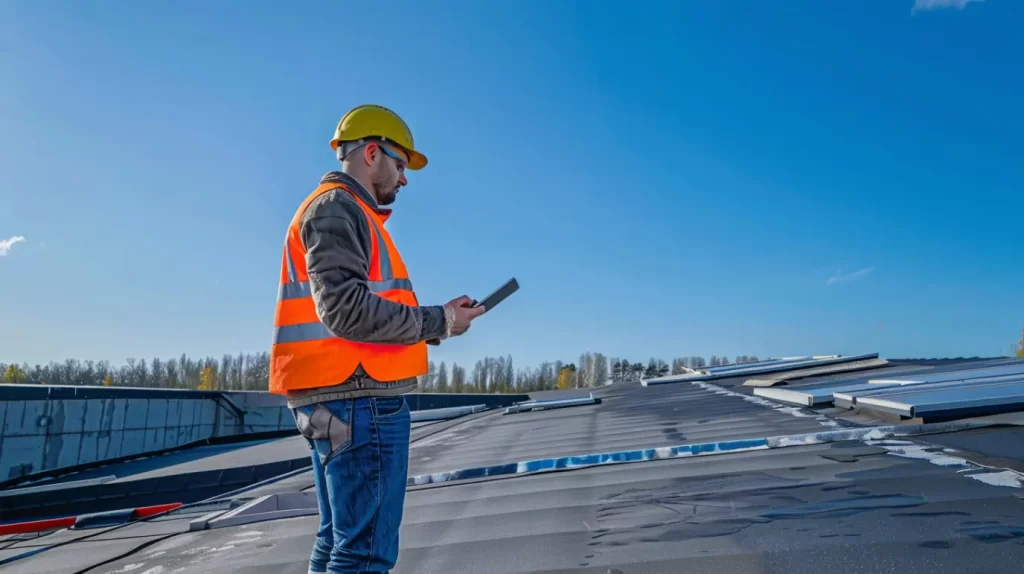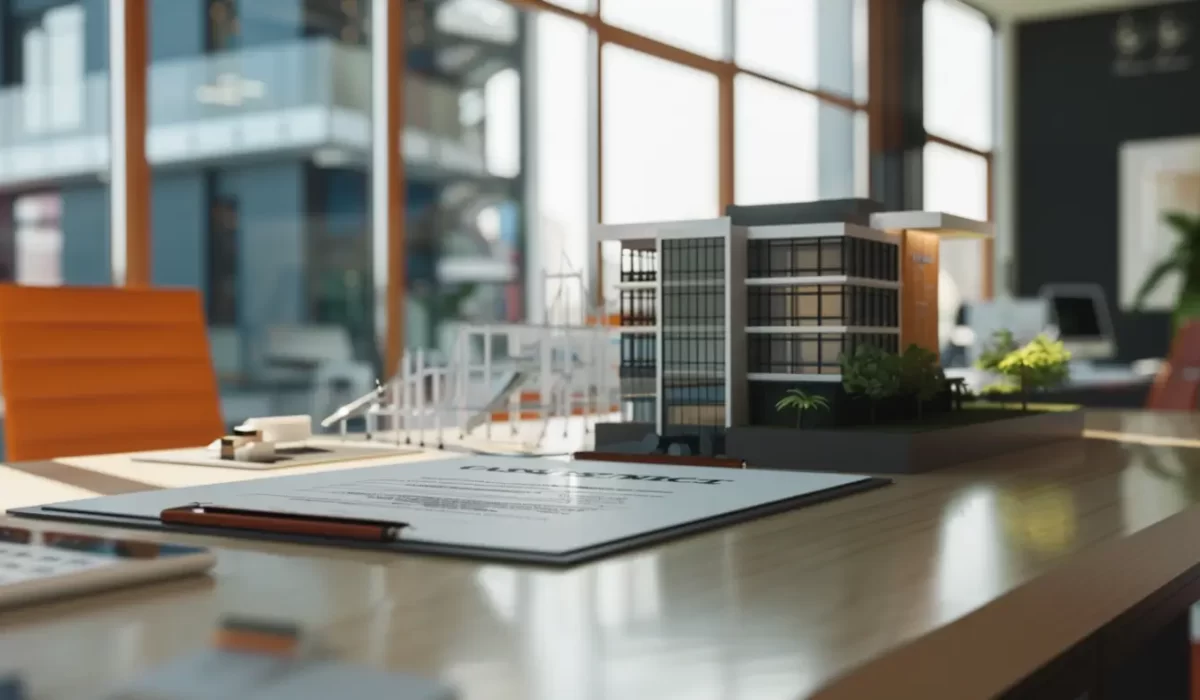Clear contracts are essential for protecting your investment in commercial roofing projects. Building owners, property managers, and HOAs in Anaheim, CA must ensure every aspect of the job is addressed, especially during roof replacements or repairs. Fontaine Roofing offers tailored commercial roofing solutions that meet industry standards and legal requirements. Including all key components in your contract safeguards your investment, ensures a smooth roofing process, and helps maintain your building’s integrity for years to come.
Understanding Commercial Roofing Contracts for Property Managers and HOAs
Managing commercial roofing contracts can be challenging for property managers and HOAs. Understanding essential contract elements safeguards your building and finances by ensuring clarity on the required work and coverage duration.
Fontaine Roofing in Anaheim, CA, emphasizes the importance of a clear contract. Key components include legal coverage, contractor qualifications, and post-work responsibilities. By focusing on these elements, property managers and HOAs can clarify roles, identify potential issues early, and ensure everyone is aligned from the beginning.
Contact Us
The Importance of Clear Contracts in Anaheim, CA
In Anaheim, CA, commercial roofing contracts are shaped by weather and legal factors. Clear agreements with contractors like Fontaine Roofing prevent misunderstandings and unexpected costs, ensuring smooth roof replacements and maintenance for property managers and HOAs.
When reviewing proposals, verify the contractor’s license, project details, material specifications, and estimated costs. Always request written warranties and clarify payment plans.
Legal Protection and Compliance Requirements
Robust legal protection in commercial roofing contracts is essential for property managers and building owners. Clear terms outline obligations and minimize disputes. Ensuring compliance with local regulations upholds project integrity. Confirm that the roofing contractor has a valid license and worker’s compensation coverage to reduce liability.
Contracts should detail required documents, such as insurance certificates and warranty information, offering reassurance against material defects and workmanship issues. This clarity enhances transparency between building owners and roofing companies, leading to better project execution and adherence to industry standards.

Essential Elements Every Commercial Roofing Contract Should Cover
A solid commercial roofing contract is crucial for project success. It should clearly outline the scope of work, project details, and roof inspection steps, providing legal protection and clarity for both property managers and HOAs. When key components are well-defined, risks decrease, and high standards are maintained during repairs or replacements.
Fontaine Roofing ensures every contract in Anaheim, CA covers all essential elements for commercial roofing, fostering clarity and trust. Let’s explore these key components, starting with the project scope.
Scope of Work and Project Specifications
A comprehensive scope of work is essential for a successful commercial roofing project. It should specify materials, installation techniques, and project details to set clear expectations for building owners and contractors.
Addressing specifications helps prevent issues such as structural damage or material defects during replacement. Including provisions for regular inspections and maintenance ensures the roof’s long-term integrity. A well-defined scope fosters transparency and builds trust between contractors and property owners, leading to a smoother roofing process.
Timeline, Milestones, and Scheduling Details
A comprehensive timeline for a roofing project is essential for efficiency and coordination among all parties. Clearly defined milestones should include inspections, material procurement, and installation. Project management techniques help contractors adhere to the schedule, enabling property managers to monitor progress and address unforeseen issues swiftly.
Scheduling must account for weather conditions that could affect timelines. Incorporating flexibility allows building owners to mitigate delays caused by severe weather or other factors. This proactive approach enhances communication, supports roof longevity, ensures timely completion, and optimizes material performance.

Material Options and Manufacturer Partnerships
Selecting the right materials is crucial for the longevity of commercial roofing systems. Building owners should choose options like metal roofs, thermoplastic membranes, or roof coatings that meet their structure’s needs and desired lifespan while adhering to energy efficiency and weather resistance standards.
Partnering with reputable manufacturers boosts project reliability. A trustworthy contractor will explain warranties covering material defects and severe weather protection. Contracts should detail material selections and recommendations, ensuring clarity in maintenance and repair expectations.
Specified Roofing Systems and Product Brands
A successful project utilizes trusted materials from brands like GAF, CertainTeed, and Polyglass, renowned for their high-quality commercial products. Each brand offers unique features to meet various roofing needs. Choosing these reputable names ensures solid warranties and enhanced roof integrity during severe weather. Additionally, a well-executed roofing project improves energy efficiency, providing building owners peace of mind through informed long-term choices for their roofs.
Role of Certified Applicators and Awards
Certified applicators ensure commercial projects meet high standards. Contractors with titles like GAF Master Elite and CertainTeed Shingle Master demonstrate quality work and adherence to industry standards, using premium materials. These certifications enhance the contractor’s reputation and provide building owners with peace of mind, knowing their roofs are in capable hands. Understanding these qualifications is vital for maintaining a strong, durable commercial roof.

Licensing, Insurance, and Required Documents
Before agreeing to a commercial roofing job, it’s crucial to verify the contractor’s license and insurance. In Anaheim, CA, Fontaine Roofing complies with all state and local regulations, ensuring your property is protected from unexpected issues. Always request proof of the contractor’s license and worker’s compensation insurance to confirm their responsibility and good standing.
Let’s explore what you need to check before starting a commercial roofing project and why these certifications are important for you.
License Verification and Proof of Insurance
Verifying a roofing contractor’s license ensures compliance with local regulations and industry standards, providing peace of mind for property managers and HOAs. Confirming their insurance protects against unexpected costs from accidents.
Insurance should cover general liability and worker’s compensation to safeguard both the building owner and crew. This verification minimizes risks related to structural damage or severe weather impacts on the roofing system.
Required Certifications and Memberships
A reputable commercial roofing contractor should hold the necessary certifications and be affiliated with organizations like the National Roofing Contractors Association (NRCA), California Association of Roofing Professionals (CAI), and California Association of Commercial Management (CACM). Membership in these groups enhances trust among building owners, demonstrating the contractor’s adherence to industry standards and commitment to quality work. This assures you of their dedication to ongoing learning and compliance with legal requirements, providing peace of mind during your roofing project.

Budgeting, Payments, and Change Orders
Clear and organized budget estimates, payment terms, and change order rules are crucial for commercial roofing contracts. Written details protect property managers and HOAs from unexpected expenses and disputes. A well-structured contract aligns all parties and minimizes misunderstandings. Fontaine Roofing in Anaheim, CA, offers comprehensive roofing estimates with itemized costs and clear change order explanations.
Detailed Cost Breakdown and Contingency Allowance
Transparency in financial matters is crucial for roofing projects. An itemized cost breakdown helps property managers and building owners understand expenses for materials, labor, and services, enhancing accountability and revealing cost-saving opportunities.
Including a contingency for unforeseen charges from extreme weather or structural issues is essential for managing repair costs and preserving the roof’s integrity. Detailed financial planning promotes informed decision-making, ensuring all parties are prepared for the project’s financial implications and maintaining good standing throughout.
Payments, Deposits, and Change Orders
Clear payment schedules and deposit requirements are vital for a successful commercial roofing contract. They set expectations and minimize disputes, impacting cash flow and contractor compliance with industry standards.
Equally important are comprehensive change order procedures, which allow for project adjustments without disrupting timelines or budgets. By clearly outlining the process for changes, both the building owner and contractor can amicably manage unforeseen expenses.

Warranties, Maintenance, and Termination
Clear warranty, maintenance, and ending terms are important for long-term peace of mind when you choose a commercial roof. Fontaine Roofing’s contracts in Anaheim, CA, show the differences between a manufacturer’s warranty, workmanship coverage, and regular maintenance requirements. You will always know how protected you are.
Let’s look at what you need to check in these key parts of the contract to make sure your commercial roof investment is safe.
Manufacturer and Workmanship Warranties
Warranties are essential in commercial roofing contracts, protecting property owners from defects. A manufacturer’s warranty covers material flaws, ensuring compliance with industry standards and long-term performance, thus safeguarding your investment.
Workmanship warranties assure professional installation, covering issues like improper techniques and providing peace of mind. Understanding the duration and conditions of these warranties helps avoid unexpected costs and extends your roof’s lifespan. Prioritizing warranties is crucial for informed roofing decisions.
Maintenance Duties and Contract Termination
Every commercial roofing contract should outline maintenance responsibilities and termination conditions. Regular inspections are crucial for extending the roof’s lifespan and preserving your warranty.
Fontaine Roofing offers a maintenance plan that includes routine checkups, prompt repairs, and detailed records to manage repair costs and identify issues early.
The contract should also feature penalty-free termination clauses for both parties in case of rule violations or unforeseen events. An exit plan provides peace of mind and protects your property. By ensuring regular inspections, clear repair cost plans, and defined guidelines, you safeguard your investment and ensure lasting tranquility.
What’s Next
In summary, property managers and HOAs in Anaheim, CA must have a clear commercial roofing contract. This ensures all key aspects—scope of work, project details, licensing, and warranties—are covered, protecting your buildings and facilitating a smooth start with your contractor.
Fontaine Roofing is a GAF Master Elite Contractor and Certainteed Shingle Master. They emphasize the importance of meticulous record-keeping and adherence to regulations for quality workmanship. For a hassle-free commercial roofing project, contact Fontaine Roofing to discuss your needs.
Read our blog: Energy-Efficient Roofing Options for Association Buildings
Frequently Asked Questions
What documentation should Fontaine Roofing provide before starting my commercial roofing project?
Fontaine Roofing will show you proof of its contractor’s license, liability and worker’s compensation insurance, along with certifications like GAF Master Elite and NRCA membership. These papers show that we are in good standing as a roofing contractor. They also make sure you and your commercial roofing project have legal protection.
Which specific warranty clauses are vital for property managers and HOAs?
Important warranty clauses list the length and what is covered in the manufacturer’s warranty. The workmanship warranty also matters. The rules for regular maintenance are there too. These things tell you about the levels of protection you get and give you peace of mind, showing how any issues will be handled during the warranty period.
How do I spot red flags in commercial roofing contracts in Anaheim, CA?
Check for missing details such as contractor information, licensing, and insurance. Ensure a clear payment schedule and verify the brands of materials used. Be wary of contractors in poor standing or those requesting large upfront payments. Understand all costs to avoid hidden fees or surprises—these may indicate potential issues.

